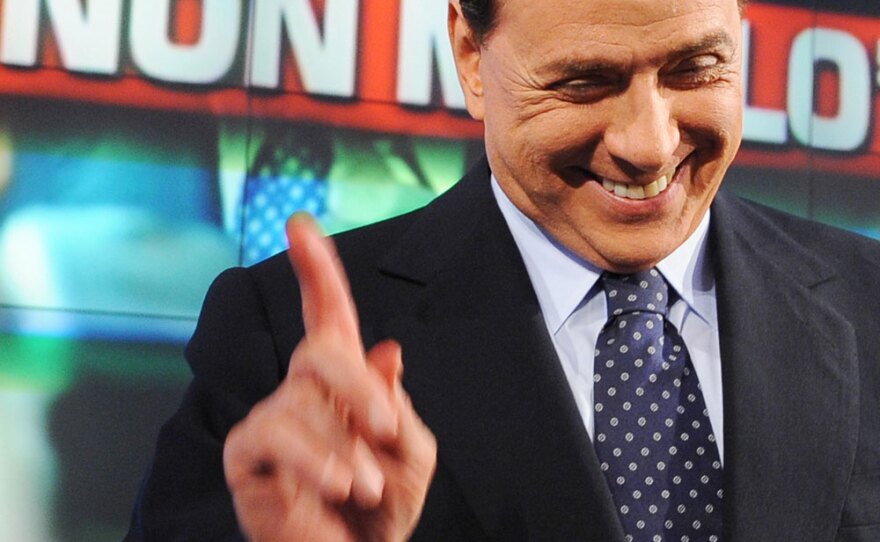Allegations of sexual impropriety by Italian Prime Minister Silvio Berlusconi continue to top headlines in countries throughout Europe, where commentators say their leaders would have had to step down long ago had they been embroiled in similar scandals.
Not Berlusconi. Thanks to his control of national TV, many Italians are far less informed about the stories swirling around the Italian prime minister than their European neighbors.
At a press conference in Rome last week, many journalists warmly welcomed Berlusconi, and with a flourish, he announced a new tourism campaign promoting Italy as the world's No. 1 cultural destination.
"Our Italian identity and culture are based on a civilization that began several millennia ago and never underwent a period of decadence," Berlusconi said.
Many European analysts don't agree: They say it's precisely Berlusconi who has led contemporary Italy into a state of decay, comparing his behavior to that of the Roman Emperor Nero.
'He Very Much Likes Women'
Over the years, Berlusconi, 72, has dodged allegations of links to organized crime, illicit business practices and bribing judges.
Over the past several months, photos and firsthand accounts have revealed wild sex parties at Berlusconi's residences and offers of political appointments in exchange for sex.
Audiotapes in which Berlusconi allegedly discusses graphic sex while in bed with a prostitute followed.
Berlusconi has not denied it is his voice on the tape, and just quipped, "I'm no saint."
Margherita Boniver, a lawmaker in Berlusconi's People of Freedom party, defends the prime minister.

"He has never lied. He has always, more or less, admitted very openly that he very much likes women," Boniver says.
"And I think this is something Italians understand — they possibly don't not condone it, but they understand," she adds.
But David Lane, a correspondent in Rome for The Economist and author of a book about Berlusconi, says it remains unclear exactly what Italians know.
"Here we have someone who is powerful, extremely rich and determined to hang on to power, and the Italians are not allowed the information that other democracies have," Lane says.
Scant Media Coverage
Critics of the prime minister point out that through ownership and through political influence, Berlusconi controls about 80 percent to 90 percent of Italian TV — networks that have provided little or no coverage of the scandals.
The left-leaning daily La Repubblica is one of the few media outlets extensively covering the Berlusconi sex saga.
Every day for the past three months, La Repubblica has been publishing 10 questions for Berlusconi, but he refuses to answer and also reneged on his pledge to explain his behavior before Parliament.
Berlusconi claims La Repubblica is spearheading a conspiracy against him and has called on business leaders to refrain from placing ads in media that are critical of him.
The newspaper's editor, Ezio Mauro, has vowed to continue publishing the questions until the prime minister deigns to answer them.
Mauro says the problem is that most Italians get their news only from TV.
"This is the Italian news paradox: The TV audience hears Berlusconi's denials but never hears the substance of what he is denying. This is his basic conflict of interest: He is the only leader in the world who controls the TV universe and can eliminate real facts that are unpleasant for him," Mauro says.
'A Culture Of Illegality'
In recent years, Italy has recorded among the highest levels of tax evasion among Western countries and the largest number of serving members of Parliament found guilty of criminal offenses.
In a recent report, the state accounts court said corruption in the public administration is so vast that it is preventing the country's economic development and eroding the public's faith in government.
Rolando Patarca, a fisherman who is also a part-time chef and political activist, is demoralized by the society he sees around him.
"A culture of illegality has taken hold. We no longer have an ethical role model. We no longer want to follow the rules and respect the law and the constitution. We are in disarray, and we have given up. We have lost sight of our basic civil rights," Patarca says.
Berlusconi is fond of saying, "Italians like me the way I am."
Through two decades of TV dominance, many analysts say he has, in fact, reshaped Italian culture and values into his own image.
Copyright 2022 NPR. To see more, visit https://www.npr.org. 9(MDAzMjM2NDYzMDEyMzc1Njk5NjAxNzY3OQ001))







